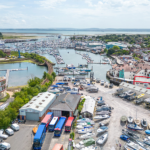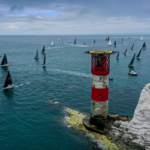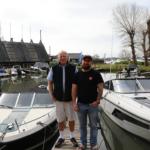The need for ocean recovery to mitigate some of the worst impacts from the climate emergency is urgent. A trio of marine organisations have come together to call the UK’s councils to arms to take action. The ‘Motion For the Ocean’ has its first city advocate, the city of Plymouth.
Marine social scientist and Plymouth City Councillor Dr Pamela Buchan, the Ocean Conservation Trust’s Nicola Bridge and Emily Cunningham from the Local Government Association Special Interest Group, are asking councils around the UK to endorse a new ‘Motion for the Ocean’, recognising the importance of the world Ocean for climate change, and the role that local and national governments need to play to maintain it.
Plymouth City Council is the first in the UK to declare an urgent need for Ocean Recovery. The team are now proposing city councils across the country follow suit. Emily Cunningham is presenting the motion to ‘Coastal SIG’ this week. 57 councils are members of Coastal SIG, and they cover 60% of England’s coast and 16 million residents, who would be affected by raising sea levels and catastrophic changes to the ocean environment.
The marine trio are asking these local governments to align Ocean Recovery with their Climate Emergency response – by passing the motion, indicating a commitment to ocean recovery and improvement in the way that marine environments are used and managed. They are calling for individuals to act as marine citizens and ask local councillors to support and adopt the motion across the country.
The Ocean Recovery Declaration Motion, or ‘Motion for the Ocean’ proposes the following pledges:
- Make sure local councils consider the Ocean when making decisions around budgets, planning, skills and regeneration.
- Ensure that industries that are linked to the sea, such as fishing, marine technology, renewable energy and aquaculture, continue to develop in a sustainable and equitable way.
- Create an Ocean portal to show progress on this work.
- Request that central government do everything within their power to put the Ocean into recovery.
- Ensure that all pupils have a first-hand experience of the Ocean before leaving primary school.
- Support and promote sustainable and equitable access to the Ocean through physical and digital experiences.
Nicola Bridge, Head of Ocean Advocacy and Engagement at the Ocean Conservation Trust, said: “All of our work at the Ocean Conservation Trust is centred around people. Our Think Ocean Challenge is designed specifically to bring the ocean to the forefront of people’s minds and help them to think about the ocean in their everyday lives. For too long, the ocean has been missing from discussions at local and national government levels, meaning that decisions are made that do not reflect the importance of a healthy ocean. At policy level, ocean health is not recognised as essential for human health. We are pleased to have been part of the creation of this model ‘Ocean Recovery Motion’ and hope to see councils across the UK adopting it and taking steps towards better recognition of the importance of ocean health.”
2021 is the start of the UN Decade of Ocean Science for Sustainable Development and the year the UK has taken centre stage in climate and environmental political action at COP26 in Glasgow in November and the G7 in Cornwall in the summer. With the COP26 agreement recognising that we need to “consider how to integrate and strengthen Ocean-based action”, the time is now for government at all levels to recognise the need for ocean action.
International Environment Minister Lord Zac Goldsmith said at COP26: “The ocean plays a unique role in regulating our climate. There is no pathway to net zero – or any of our shared global goals – that does not involve protecting and restoring nature, including the Ocean, on an unprecedented scale.”
As well as a series of asks for local authorities, the evidence-based Motion for the Ocean draws on a list of national government actions proposed by marine scientists, including lead author Dr Sian Rees from the University of Plymouth, to improve marine conservation management and help the UK to become a global leader in fisheries management and marine conservation.
Coastal local authorities have a range of coastal responsibilities within their powers, including coastal defence and flooding, shoreline management, and contribution to marine protected area management. All local authorities, however, can share in the collective responsibility to improve marine management through a wide range of strategies and actions, including educational approaches; water, waste and land management; and the full remit of climate emergency actions many have already committed to. The Motion for the Ocean embraces the Source-to-Sea approach, highlighting the direct connection that we all have to the sea through rivers and drainage, and the important impact of land-based carbon emissions on ocean health.
Cllr Dr Pamela Buchan, Labour Councillor, marine social scientist and the motion proposer, said: “For too long, the ocean has been side-lined in climate debates and taken for granted by our island nation. The weight of ocean-focused events at COP26 show that the tide is turning, and people and politicians are beginning to understand that we can’t mitigate the impacts of climate change without addressing how we use and manage our coastal and ocean environments.
“The motion recognises the importance of connecting people to the ocean, rather than excluding them from it. We need to change our approach to how we use the sea so that it can recover from our harmful impacts, and coastal communities can benefit from sustainable marine industries and businesses and the wellbeing that the coast offers. There is something for everyone in this motion: a chance for people to engage in marine citizenship and ask their elected representatives for action; a chance for local authorities to recognise the value of the marine environment, even if they are inland; and key asks for national government to improve their policies and actions.”
Cllr Tudor Evans, Leader of Plymouth City Council’s Labour Group, said: “As Britain’s Ocean City, it was vital that our Council took a lead in calling for firm action for ocean recovery. Damage to the environment isn’t always visible or obvious. When we set up the UK’s first National Marine Park, in Plymouth Sound, it was in part to focus attention on what lies beneath the waves, and also to ensure that future generations can continue to benefit from what the area and our rich local coastline can offer in terms of sustainable jobs, health and wellbeing.”
Emily Cunningham, Lead Officer of the LGA Coastal Special Interest Group, said: “Coastal local authorities are working hard to bring about a brighter future for the communities we serve, yet too often we overlook the opportunities and benefits that a healthy ocean could provide. The LGA Coastal Special Interest Group recognise that our ocean is in a state of emergency and that local government has an important role to play in recovering it to health. This model motion has been developed to help Councils, whether they are coastal or inland, identify ways they can make a difference for the ocean. We are ready to support all Councils in stepping up to take ocean action now. There’s no time to waste.”
Dr Sian Rees, Senior Research Fellow at the University of Plymouth said: “An Ocean Recovery Declaration signals that a Local Authority fully recognises the role of the ocean in supporting human wellbeing. This declaration therefore sets an increased ambition for ocean conservation that will not only work to reverse the global decline in marine biodiversity but, more importantly, enable increased security for the lives and livelihoods that depend on healthy marine ecosystems.”



















